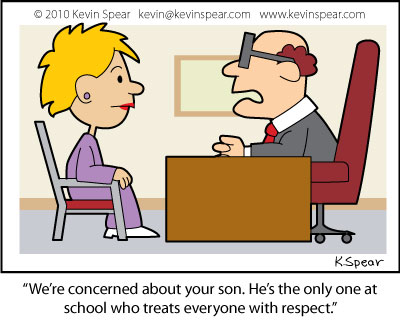If you have taught your child the importance of good manners but are dismayed at some seemingly rude behaviors, there might be something else going on. Consider a daughter with a kind spirit who looks the other way when a schoolmate says hello. Or, a son who is generally appreciative but, "forgets" to send out thank you notes. What about a teenager who seems to dote on her friends at school but doesn’t return their phone calls? From the outside, it might look like these kids are lazy or selfish and we might be tempted to read them the riot act. But, if we take a moment to look deeper we might discover important clues about these children’s personalities and emotional needs.
Many of the “polite” things we ask kids to do are fairly sophisticated. For example, looking an adult in the eye when being introduced. If a child is shy or insecure this kind of obligation can create uncomfortable feelings and even anxiety. Some children are gregarious and can strike up conversations anytime with anyone, but a more pensive child might feel put on the spot to perform and become verbally paralyzed. Think how frightening this would be. It’s no wonder if she ignores people. After all, you don’t have to talk to someone you don’t see. For some children, expressing their gratitude on paper can feel awkward. It’s understandable then if these children put off their duty until so much time has passed that they now have to explain their tardiness as well. At this point it‘s easier to pretend that the card really doesn‘t matter. Or, consider an introvert who’s been told “don’t be anti-social.” This child may try to be something she’s not and as a result exert a tremendous amount of energy trying to be social. By the time she returns home from school she’s exhausted and the thought of continuing the social demands by phone are unbearable.
Because the emotional health of children is more important than what people think of us, we parents may occasionally have to give our child a manners break. Instead of demanding to know why your child is being so rude, try asking non judgmental questions or sharing your own struggles to meet society‘s expectations. Then allow your child to explore comfortable options. Also, don’t forget that displaying good manners is a skill that will come more naturally when a child is developmentally ready.
 |
| (cartoon courtesy of www.kevinspear.com) |
Many of the “polite” things we ask kids to do are fairly sophisticated. For example, looking an adult in the eye when being introduced. If a child is shy or insecure this kind of obligation can create uncomfortable feelings and even anxiety. Some children are gregarious and can strike up conversations anytime with anyone, but a more pensive child might feel put on the spot to perform and become verbally paralyzed. Think how frightening this would be. It’s no wonder if she ignores people. After all, you don’t have to talk to someone you don’t see. For some children, expressing their gratitude on paper can feel awkward. It’s understandable then if these children put off their duty until so much time has passed that they now have to explain their tardiness as well. At this point it‘s easier to pretend that the card really doesn‘t matter. Or, consider an introvert who’s been told “don’t be anti-social.” This child may try to be something she’s not and as a result exert a tremendous amount of energy trying to be social. By the time she returns home from school she’s exhausted and the thought of continuing the social demands by phone are unbearable.
Because the emotional health of children is more important than what people think of us, we parents may occasionally have to give our child a manners break. Instead of demanding to know why your child is being so rude, try asking non judgmental questions or sharing your own struggles to meet society‘s expectations. Then allow your child to explore comfortable options. Also, don’t forget that displaying good manners is a skill that will come more naturally when a child is developmentally ready.
